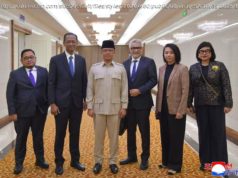Michael Lynton, former Sony CEO, shared some of the lessons he’s learned after being hacked by North Korea.
Lynton helmed Sony Entertainment (SNE) when it was the target of a massive hack in December 2014. Hackers, who were linked to the North Korean government, crashed the company’s computer systems and leaked the studio’s films and emails containing sensitive information. Lynton said it left the studio in crisis mode for “easily” five months.
“It was one of those instances where the company would’ve either fallen off a cliff and not survived or … pull it through, through collective action, ” said Lynton at the Lerer Hippeau Ventures’ annual CEO Summit in New York on Wednesday.
It’s a situation that more businesses will undoubtedly find themselves in. Organizations around the globe are reeling from a large-scale global cyberattack that hit last week. Researchers have found potential links to the same North Korean hackers.
Lynton said the Sony hack was predated by a threat from North Korea urging Sony not to produce The Interview, a comedy about trying to assassinate Kim Jong-Un. At the time, Lynton says Sony took what it thought was the necessary precautions. But quite simply, Lynton said they didn’t know what North Korea would possibly do when they moved forward with the movie’s release.
Related: North Korea’s long history of hacking
Lynton, who stepped down as Sony’s chief in January 2017, shared some advice — including one personal lesson he took from the hack.
“My email now comes down onto a hard disk every ten days, ” said Lynton, in conversation with Lerer Hippeau Ventures managing partner Kenneth Lerer. “To me, that’s the solution. Put it in a drawer and lock the drawer.”
Lynton said firms shouldn’t have healthcare records, social security numbers and other sensitive documents on their servers, which could potentially be hacked. Should executives find themselves in scenarios like his, they should remain “ridiculously optimistic.”
Related: Researchers find possible North Korea link to massive hack
“You have to come into work every day and say to everybody around you: We are going to get through this, ” he said. “I made a concerted effort to keep that optimistic look on my face when I came to work … you don’t want to be Pollyannish but it was hugely helpful to do that.”
Lynton, who is now chairman at Snap (SNAP) , said his job function at Sony effectively, and rightfully, changed so that he was managing the crisis full time. “You cannot, under any circumstances, give away any authority at that point.”






